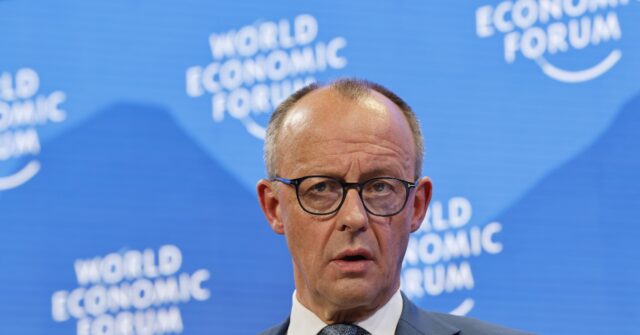Appearing at the World Economic Forum’s annual meeting in Davos, Switzerland on this week, Christian Democratic Union (CDU) leader Friedrich Merz said that he will “never” allow “right-wing populists into a government, which is led by me.”
“I will try to get my partners in this coalition convinced that we have to immediately resolve the problems which made them as strong as they (the AfD) are today,” Merz said.
The head of the formerly Merkel-led party argued that centrist parties in Germany need to “resolve the problems which are seen by the people this is migration, this is anxiousness all day in terms of Labor Market… [and] criminality.”
With Merz’s CDU/CSU Union only hovering around a third of support from voters and his pre-emptive refusal of working with the AfD, the most likely coalition partner would be the Social Democrats (SPD) of current Chancellor Olaf Scholz. The other possible option would be with the hard-left Greens; however, Merz’s partners in Bavaria have categorically rejected such a coalition.
While Merz and others frequently hype up the supposed threat to democracy posed by the AfD, a partnership with the leftist SPD could potentially result in resistance to enforcing existing migration laws or even introducing new legislation to curb mass migration from within his own future government.
The CDU leader acknowledged that the rise in popularity of the AfD — currently in second place at around 20 per cent — was fuelled by concerns over mass migration, which the country was first opened up to by his party’s former boss, Chancellor Angela Merkel, who unilaterally decided to open the gates of Europe to vast swathes of migrants from Africa and the Middle East, sparking the 2015 Europe Migrant Crisis.
Upon coming into office in 2021, Chancellor Scholz’s government doubled down on the open borders agenda. It has only made small steps starting to walk back on the issue following a string of high-profile terror attacks at the hands of migrants over the past year, including the Magdeburg Christmas Market Attack that saw six killed and hundreds injured as a migrant from Saudi Arabia drove a car into the crowd.
It is perhaps unsurprising then that support for both establishment parties has withered. In the 1976 federal elections in Germany, the CDU and SPD won a combined 91.2 per cent of the vote. In the 2021 elections, it fell to 49.8 per cent, and according to the latest polling, support for the establishment parties is set to decline again in February’s elections.
The crumbling support for the SPD and CDU in Germany follows the recent collapse of other European neo-liberal parties, which also attempted to impose a cordon sanitaire around right-wing populist parties.
The most dramatic reversal of such a policy was seen last year in the Netherlands, where Dutch populist Geert Wilders and his Party for Freedom (PVV) formed a government after winning the 2023 elections. Their national conservatives had absolutely ruled out going into coalition with the populists before the vote but reconsidered once the results were in.
Germany’s neighbour Austria also appears on course to have a populist-controlled government in Vienna, with Austrian Freedom Party (FPÖ) leader Herbert Kickl being invited to form a government earlier this month.
Following another attack allegedly at the hands of a migrant from Afghanistan on Wednesday in the town of Aschaffenburg that left two dead, including a young child, and left others seriously injured, AfD chancellor candidate Alice Weidel said that it demonstrated the need for the CDU to work with her party, saying that there “must [not] be more deaths” because of the firewall against her party.
The AfD leader went on to call for a vote in the German Bundestag parliament next week on “closing the borders and turning back illegal immigrants.”
Follow Kurt Zindulka on X: or e-mail to: kzindulka@breitbart.com
Breitbart News
Read the full article .


